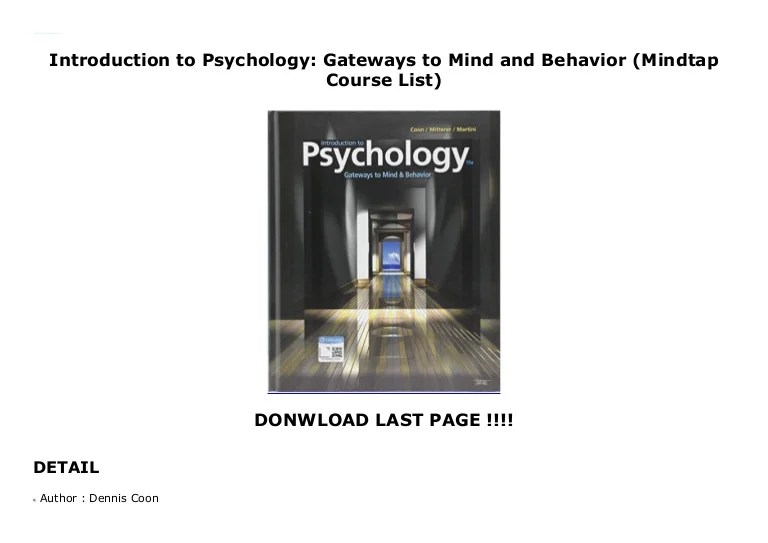Intro to psychology gateways to mind and behavior 15th edition – Delving into Intro to Psychology: Gateways to Mind and Behavior, 15th Edition, this introduction immerses readers in a unique and compelling narrative that is both engaging and thought-provoking from the very first sentence.
This comprehensive guide provides a thorough exploration of the field of psychology, from its historical development and major theoretical perspectives to its practical applications in real-world settings. With a focus on the latest research and insights, the text offers a balanced and up-to-date overview of the discipline.
1. Introduction to Psychology
Psychology is the scientific study of behavior and mental processes. It is a broad field that encompasses a wide range of topics, including human development, learning, memory, cognition, emotion, motivation, personality, and social behavior.
The history of psychology can be traced back to the ancient Greeks, who first began to speculate about the nature of the mind and behavior. However, it was not until the 19th century that psychology became a正式established scientific discipline.
Today, psychology is one of the most popular and widely studied fields in the world. Psychologists work in a variety of settings, including universities, hospitals, clinics, and businesses. They use a variety of research methods to study behavior and mental processes, and they apply their findings to help people understand and improve their lives.
Historical Development of Psychology
- Ancient Greece: Speculation about the nature of the mind and behavior
- 19th century: Psychology becomes a正式established scientific discipline
- 20th century: Rapid growth of psychology as a field
- 21st century: Continued growth and expansion of psychology
Major Theoretical Perspectives in Psychology
- Behaviorism: Focuses on observable behavior and the role of environmental factors
- Cognitive psychology: Focuses on mental processes, such as thinking, memory, and language
- Humanistic psychology: Focuses on the subjective experience of the individual
- Psychodynamic psychology: Focuses on the unconscious mind and its role in behavior
Applications of Psychological Research
- Clinical psychology: Helps people with mental health problems
- Educational psychology: Helps students learn and achieve
- Industrial-organizational psychology: Helps businesses improve employee productivity and satisfaction
- Forensic psychology: Helps law enforcement and the courts understand and prevent crime
2. Biological Bases of Behavior

The biological bases of behavior refer to the physical structures and processes in the body that influence behavior and mental processes. These include the nervous system, the endocrine system, and the immune system.
The nervous system is a complex network of cells that transmit information throughout the body. It is divided into two main parts: the central nervous system (CNS) and the peripheral nervous system (PNS).
The CNS consists of the brain and the spinal cord. The brain is the control center of the body, and it is responsible for processing information, making decisions, and controlling movement.
The PNS consists of all the nerves that connect the CNS to the rest of the body. These nerves transmit sensory information from the body to the brain, and they also transmit motor commands from the brain to the muscles.
Structure and Function of the Nervous System
- Central nervous system (CNS): Brain and spinal cord
- Peripheral nervous system (PNS): Nerves that connect the CNS to the rest of the body
- Neurons: Basic units of the nervous system
- Synapses: Connections between neurons
Influence of Genetics and Environmental Factors on Brain Development and Behavior, Intro to psychology gateways to mind and behavior 15th edition
- Genes: Provide the instructions for building and maintaining the body
- Environment: Provides the experiences that shape the brain and behavior
- Gene-environment interactions: Complex interactions between genes and the environment
Role of Neurotransmitters and Hormones in Regulating Behavior and Mental Processes
- Neurotransmitters: Chemicals that transmit information between neurons
- Hormones: Chemicals that regulate a variety of bodily functions, including behavior and mental processes
- Dysregulation of neurotransmitters and hormones: Can lead to mental health problems
3. Sensation and Perception: Intro To Psychology Gateways To Mind And Behavior 15th Edition
Sensation is the process of detecting physical stimuli from the environment. Perception is the process of interpreting and organizing these stimuli into meaningful experiences.
The five senses are sight, hearing, smell, taste, and touch. Each sense has its own specialized receptors that are responsible for detecting specific types of stimuli.
Once stimuli are detected, they are sent to the brain, where they are processed and interpreted. This process is influenced by a variety of factors, including our past experiences, our expectations, and our current goals.
Sensory Organs and Their Role in Detecting and Processing Sensory Information
- Eyes: Detect light
- Ears: Detect sound
- Nose: Detect odors
- Tongue: Detect taste
- Skin: Detects touch, temperature, and pain
Perceptual Processes Organize and Interpret Sensory Information
- Attention: Selects and focuses on certain stimuli
- Organization: Groups stimuli into meaningful patterns
- Interpretation: Assigns meaning to stimuli
- Illusions: Perceptual experiences that do not accurately reflect the physical world
4. Learning and Memory
Learning is the process of acquiring new knowledge and skills. Memory is the process of storing and retrieving information.
There are many different types of learning, including classical conditioning, operant conditioning, and cognitive learning.
Classical conditioning is a type of learning that occurs when two stimuli are repeatedly paired together. Eventually, the conditioned stimulus will elicit the same response as the unconditioned stimulus.
Operant conditioning is a type of learning that occurs when a behavior is reinforced or punished. Reinforcement increases the likelihood that a behavior will be repeated, while punishment decreases the likelihood that a behavior will be repeated.
Cognitive learning is a type of learning that involves the use of mental processes, such as thinking and problem-solving.
Major Theories of Learning
- Classical conditioning: Pairing of stimuli
- Operant conditioning: Reinforcement and punishment
- Cognitive learning: Use of mental processes
Encoding, Storage, and Retrieval of Memory
- Encoding: Process of getting information into memory
- Storage: Process of holding information in memory
- Retrieval: Process of getting information out of memory
- Types of memory: Short-term memory, long-term memory
5. Cognition and Intelligence
Cognition refers to the mental processes involved in acquiring knowledge and understanding. Intelligence is the ability to apply cognitive skills to solve problems and adapt to new situations.
There are many different cognitive processes, including attention, memory, language, and problem-solving.
Intelligence is a complex trait that is influenced by both genetic and environmental factors.
Cognitive Processes
- Attention: Selects and focuses on certain stimuli
- Memory: Stores and retrieves information
- Language: Allows us to communicate with others
- Problem-solving: Allows us to find solutions to problems
Theories of Intelligence
- General intelligence (g): A single factor that underlies all intelligent behavior
- Multiple intelligences: A theory that there are multiple types of intelligence, such as linguistic intelligence, mathematical intelligence, and spatial intelligence
Measurement of Intelligence
- Intelligence tests: Standardized tests that measure cognitive abilities
- IQ scores: Scores on intelligence tests that are used to compare individuals
Clarifying Questions
What is the main focus of Intro to Psychology: Gateways to Mind and Behavior, 15th Edition?
The main focus of Intro to Psychology: Gateways to Mind and Behavior, 15th Edition, is to provide a comprehensive and up-to-date overview of the field of psychology, from its historical development and major theoretical perspectives to its practical applications in real-world settings.
What are some of the key topics covered in the text?
Some of the key topics covered in the text include the biological bases of behavior, sensation and perception, learning and memory, cognition and intelligence, motivation and emotion, development across the lifespan, personality, abnormal psychology, and social psychology.
What are the benefits of using Intro to Psychology: Gateways to Mind and Behavior, 15th Edition, as a textbook?
Intro to Psychology: Gateways to Mind and Behavior, 15th Edition, offers several benefits as a textbook, including its engaging writing style, comprehensive coverage, and wealth of learning tools. The text is written in a clear and concise manner, making it easy for students to understand the complex concepts of psychology.
It also provides a comprehensive overview of the field, covering all of the major topics in psychology. Additionally, the text includes a variety of learning tools, such as chapter summaries, key terms, and practice questions, to help students learn and retain the information.
